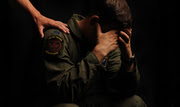

Military medicine tackles suicide with prevention tools for patients, families and providers
When it comes to preventing suicide, the military provides resources for individuals, friends, families and providers who can make a difference and help save lives. The Defense Centers of Excellence for Psychological Health and Traumatic Brain Injury (DCoE) and other Department of Defense experts collaborated with the Department of Veterans Affairs (VA) to develop a new set of tools, released last year in support of the 2013 clinical practice guideline for the assessment and management of suicide risk.
Read More ...

Monday Motivational Message: PMCS Your Body (Part 3), Move It or Lose It!
While serving in Iraq, I had to leave my car in storage for almost 12 months while deployed in support of Operation Iraqi Freedom. When I returned home, I hopped in the parked vehicle with extreme eagerness and excitement at the thought of rejoining my family. As I drove off, my car sputtered, was sluggish and even stalled in the middle of traffic. Needless to say, I was not a happy Soldier as I literally lived the phrase "going nowhere fast." What I later discovered was that my car's poor performance was the result of underuse and immobility for an extended period of time. I had to learn the hard way that if you don't move it, you will eventually lose it.
Read More ...

Combat medics train as they fight
The Army healthcare specialist has another name by which it is recognized by the general public – the combat medic. These soldiers are trained to perform all the tasks of an emergency medical technician and more, all while under enemy fire. The job is intense, and their training must reflect that intensity. Read More ...





















.png)












No hay comentarios:
Publicar un comentario